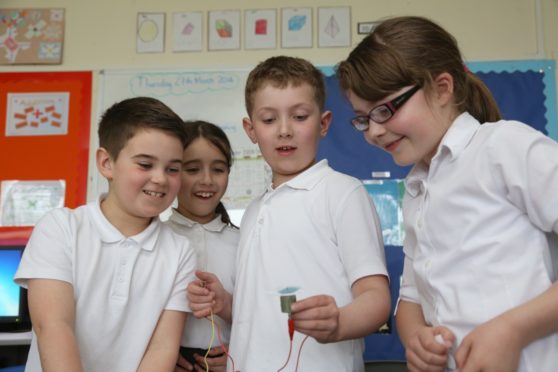A scheme aimed at improving education in science, technology, engineering and maths (STEM) has been so successful in Moray that it is being adopted nationwide.
An external evaluation of the Raising Aspirations in Science Education (RAiSE) programme, which is focused on primary school level, found that 87% of pupils in the region reported increased enjoyment in their STEM learning, with 77% saying it had increased their aspirations to work in jobs within the different fields.
In addition, 70% of teachers felt more confident in their ability to teach the subjects as a result of the project.
Having given such concrete results in Moray, RAiSE will now be rolled out across Scotland.
>> Keep up to date with the latest news with The P&J newsletter
Head of school and curriculum development at Moray Council, Vivienne Cross, said: “I can see daily, across social media and in schools, that STEM education is having an impact on our pupils with a growing enthusiasm, richer learning experiences and a deeper understanding of the local career opportunities.”
Under the programme, a partnership between Education Scotland, the Wood Foundation, the Scottish government and Moray Council, a primary science development officer was deployed to devise and deliver STEM learning while fostering community and industry relationships.
The positive findings of the project come after an external evaluation by the Robert Owen Centre at Glasgow University.
The external evaluation found that the flexibility of the RAiSE model had increased teacher confidence and pupil engagement in STEM in a “sustainable, collaborative and systemic” way.
Moray MSP Richard Lochhead, who is also Minister for Further Education, Higher Education and Science, said: “I am pleased to see the positive results from evaluation of the RAiSE pilot, particularly in raising teacher confidence in delivering STEM in the school curriculum.
“It is clear that the programme has brought benefits to those in the initial eight local authorities that participated.
“I am sure that these benefits will also be seen in the four authorities who joined the programme this year, and I look forward to more authorities taking advantage of the flexibility of the programme to suit their local needs.”
Education Scotland chief executive Gayle Gorman added: “The evidence shows us that pupils are really taking the messages of the programme onboard, with children telling us that they think that STEM should be taught in primary schools and that anyone can have a job in STEM-related careers.”

